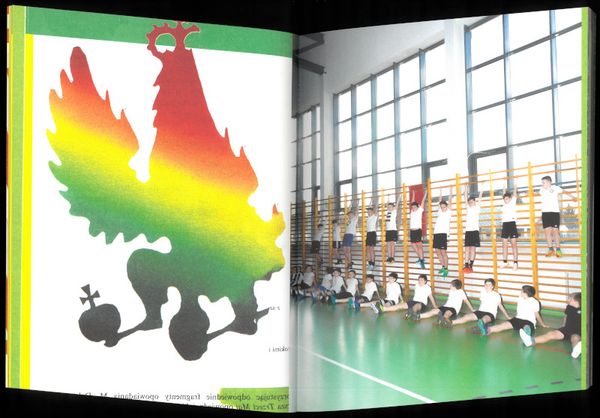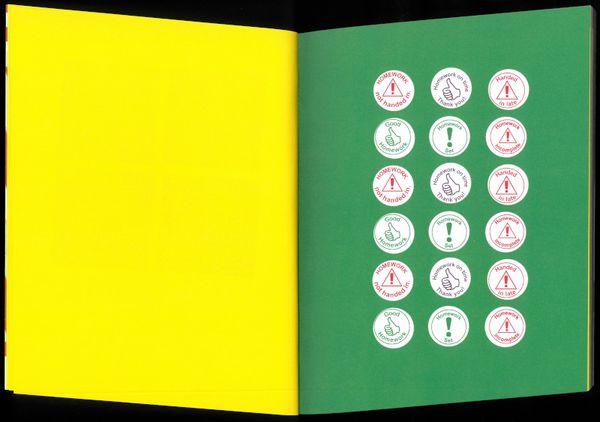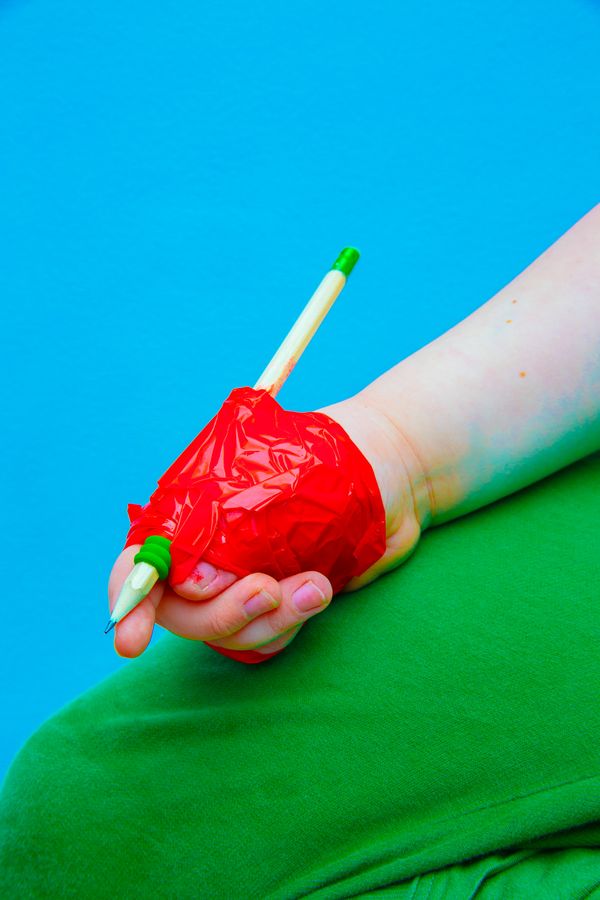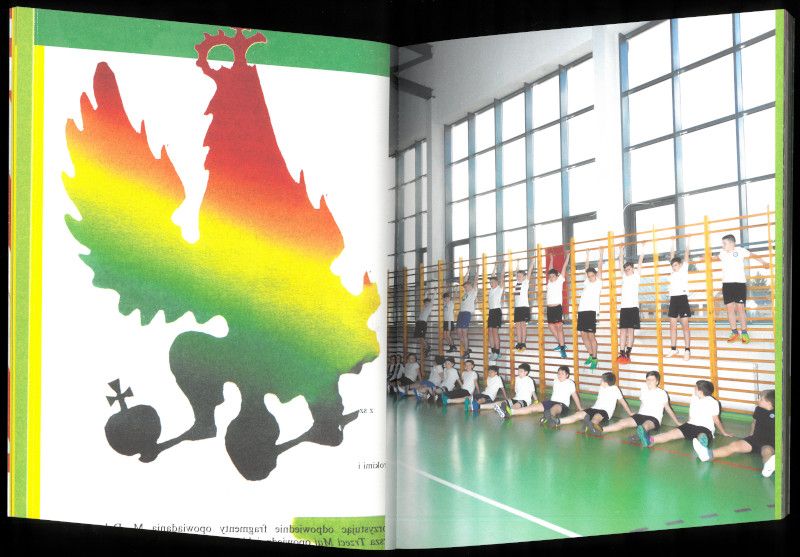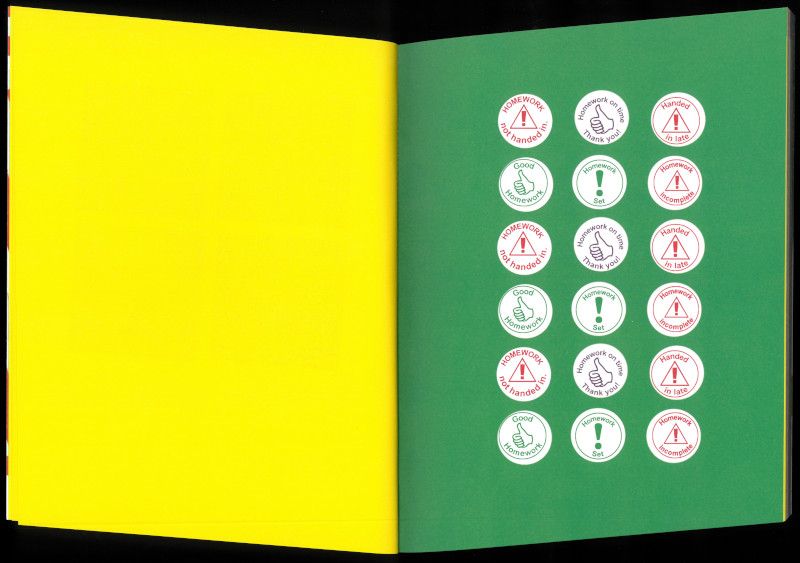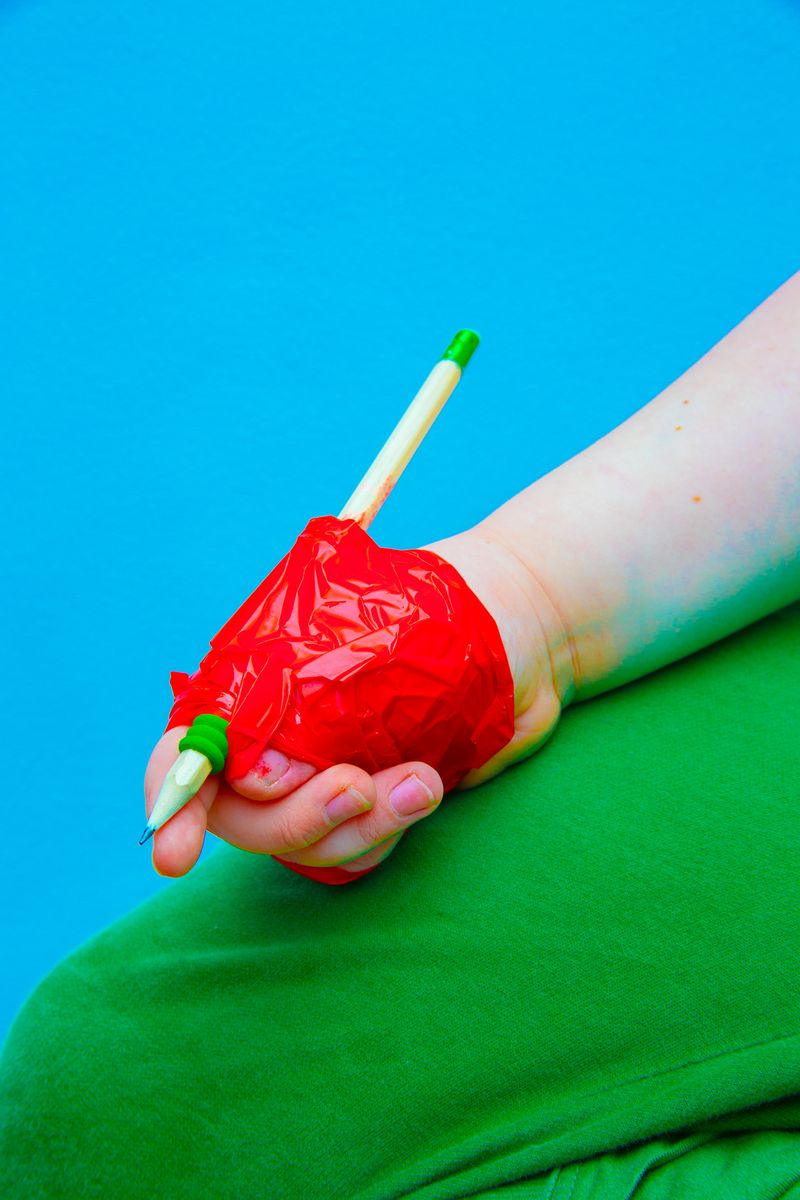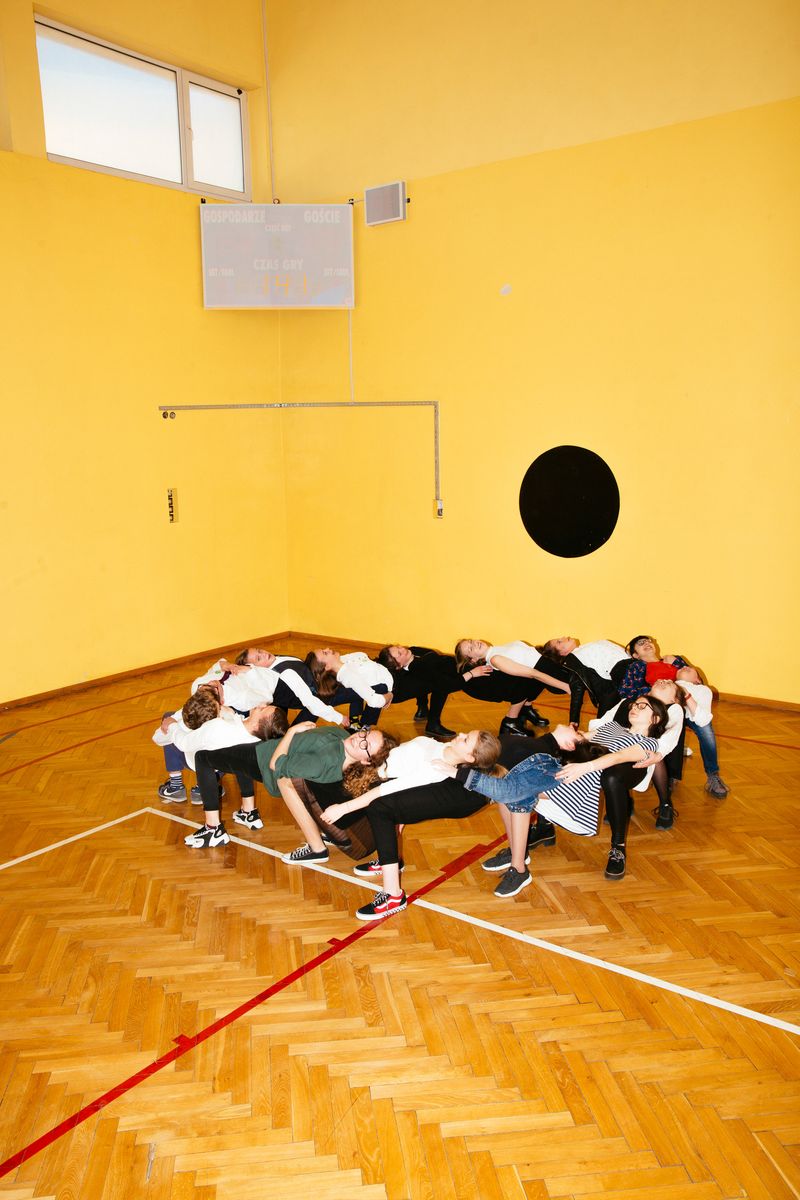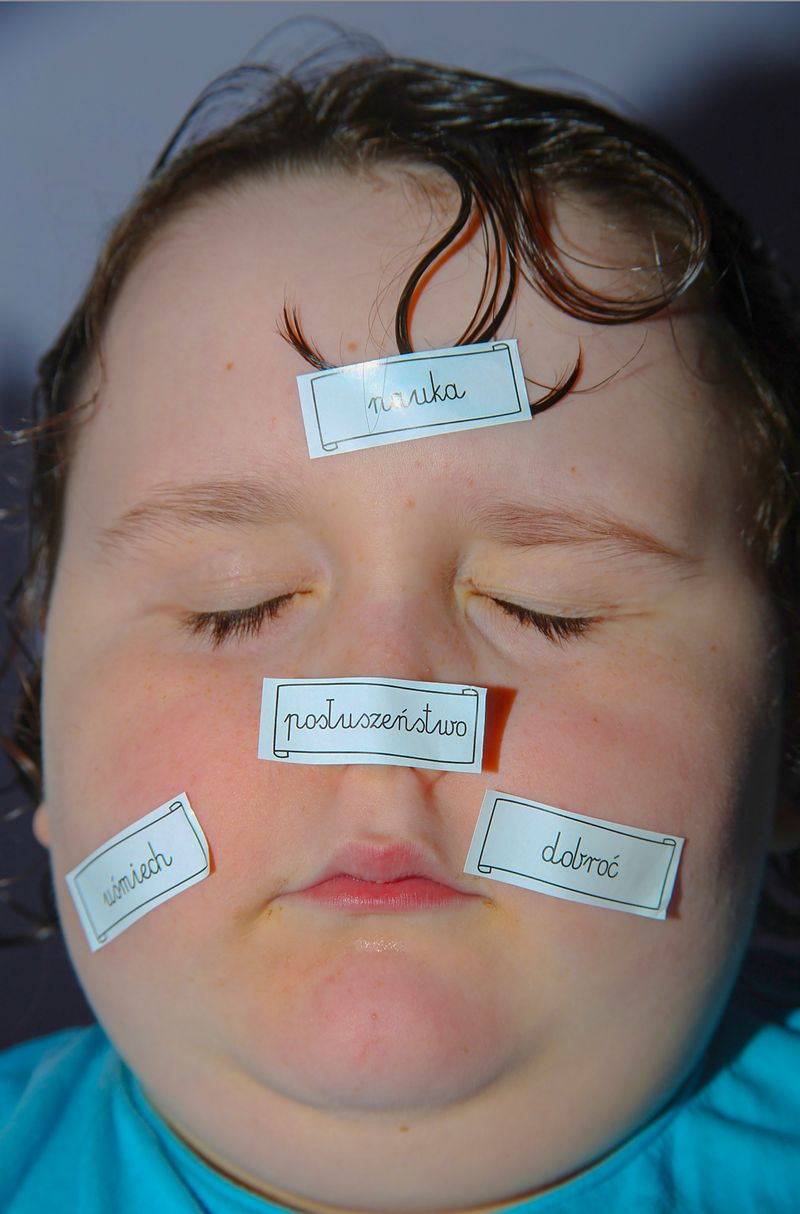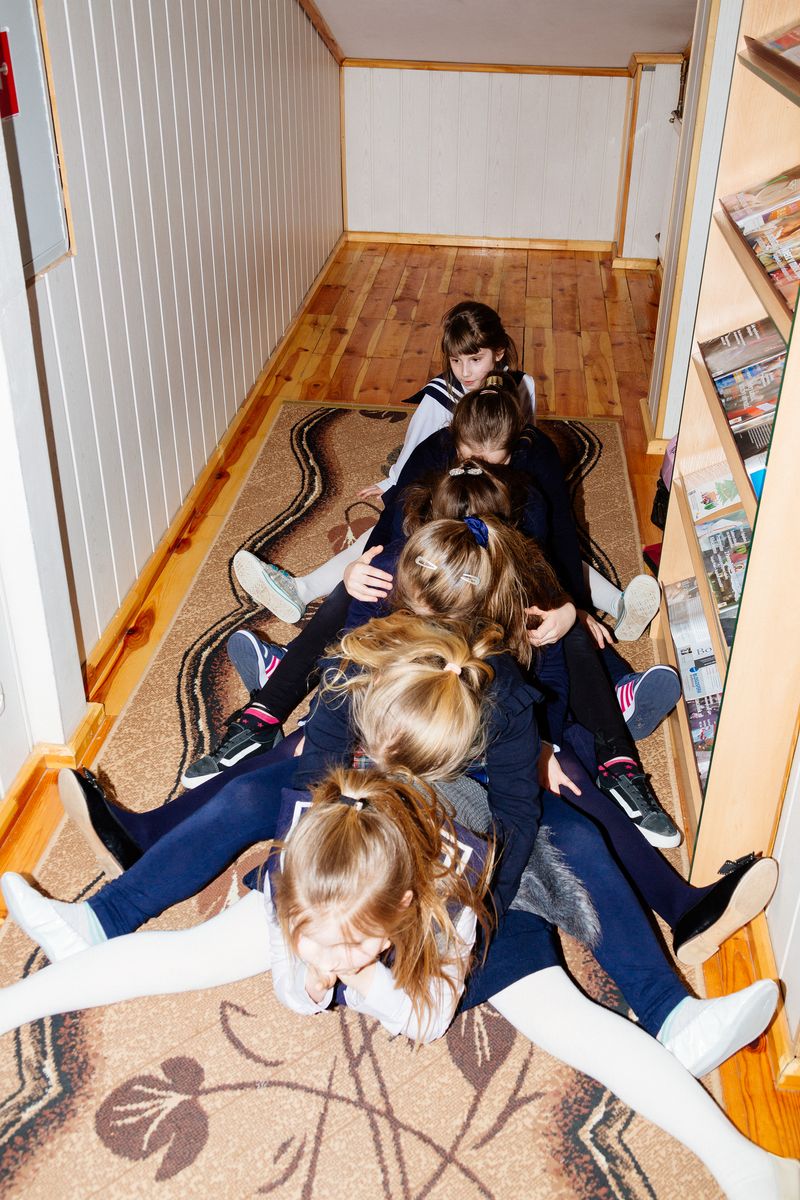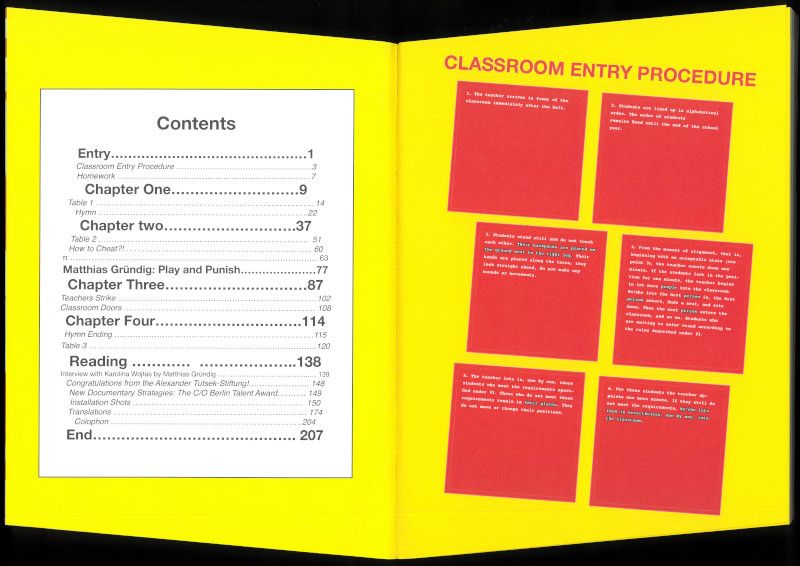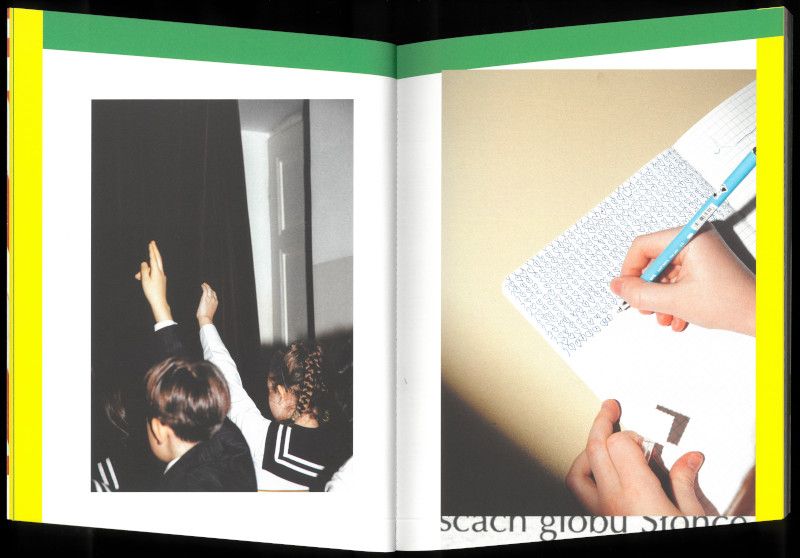Abzgram Doesn't Mean Anything: Karolina Wojtas' Critique Of The Polish School System
-
Published19 Apr 2023
-
Author
- Topics Photobooks
Abzgram is an object breaking any possible rule, where the nonsensical and the excessive are productive tools of criticism and rebellion.
Since 2017, Wojtas has been making and collecting images that revolt against the suppressive education of her country, Poland. As the winner of the C/O Berlin Talent Award 2022, Abzgram has recently been published by Spector Books: the result is an object breaking any possible rule, where the nonsensical and the excessive are productive tools of criticism and rebellion.
Abzgram mimics the aesthetic of a school textbook. Stripes of primary colours fill the edges. There are stickers complimenting the “good homework”, or pointing at the incompleteness of it. The text has scripted notes at its margins, handwritten with a red, ordinary ballpoint pen. The layout, though, is messy, based on overlaying. Images are slightly misaligned, never gridded, bleeding from one page to the other by a few millimeters which can’t look like anything but a mistake.
Writer Matthias Grunding, winner of the C/O Berlin Award Talent Award as a theorist, describes Karolina Wojtas’s work as “chaotic”- and I could not think of a better word. Chaotic as a term does not bear a destructive meaning only, Grunding explains, but also a creative, generative energy. Wojtas doesn’t only demolish: she also hints at the possibility of something new. One photograph in the book shows a boy with a set of stickers on his face: they are exhortations, in Polish, to kindness and to obedience, they say: “smile”. Abzgram isn’t kind, or obedient. If it smiles, it is probably more of a smirk. Its tones are provoking, openly laughing at any demand on how things are supposed to work. Its visual language is oversaturated, pointing, in its excessiveness, to something disquieting more than to pure joy.
“I was furious”, Wojtas tells me on the phone. Furious about what? “I started this project in 2017. The Polish government had this “fantastic” idea of changing the education system. Before it was divided into three parts: primary school, gymnasium, and high school. They decided to close the gymnasium, a lot of teachers lost their jobs, the reform happening in one year only. How could it ever have worked?”. There is, though, something more intimate and deep than her anger at a political system with its top-down cuts. A primary, personal rage feeds the subversive power of Wojtas’ images - it’s her own hatred of a school she lived through. Some of the images in the book were actually shot way before 2017, she tells me: “When I was in high school, taking photographs was my main reason to survive, in between feelings of boredom and anger”.
The Polish school system is rigid, militaristic, loaded with incomprehensible rules. “Students stand still and do not touch each other”, reads the “Classroom Entry Procedure” the book begins with. “Their backpacks are placed on the ground next to the right leg. Their hands are placed along the torso, they look straight ahead, do not make any sounds or movements”. An obsession for bodies is substantial to the work: one image shows kids sitting down in front of a gym wall bar, a row of classmates hanging on their hands from above, all perfectly geometrical and straight. In a photograph we find the legs of a guy jumping on top of a locker, then a group of children all pushed into a corner, facing the wall. A closeup shows a hand holding a pencil, forcefully tied to the fingers with red tape. When portrayed alone, the expression of children has something uncanny. When in a group, any individual trait is lost: they become indistinct volumes. A physical mass, on which power is easier to be exercised.
As Wojtas explains, the book evolves from presenting a more regular, playful version of the Polish school to a somehow more violent, evil narration. “It gets crueler, the kids are fighting”, she says. The children coming together in the usual, recurring circle now fall to the ground. About these circles, I ask Wojtas for details on the collaboration that led to them, if there was any. “It was actually bad”, she says, “I asked teachers to help me, so they told kids that they had to do it. They just did, and never asked why”. In this absurd and explosive mix of playfulness and constriction, the circle seems to be hard to break.
What else is to be found in Abzgram? A visual language of vivid and full colors, uneven framings and seemingly uncontrollable light. A constant overlaying of structures, such as the teachers’ handwritten registers, and ways to elude them: an instructional guide, for example, on how to cheat. Wojtas’ images, just as the design bringing them together, are a manifesto to a breaking of the rules. A productive one: they show how arguments can be built when eluding a system so codified it feels like a cage. They point to how the strength and urgency of a message can emerge from associative, intuitive choices, escaping any rational explanation. How the nonsensical can be a tool to say things that would suffocate in a perfectly symmetrical structure, or under a beautiful, natural, diffused light.
Abzgram doesn’t mean anything. “A nonsense word”, Wojtas says. “When you change the letters it can become bazgram, which is Polish for doodling - drawing without a purpose”.
Abzgram is published by Spector Books
204 pp. with numerous colour illustrations
Threadsewn hardcover
Width: 18.5 cm Length: 24.5 cm
Language(s): English, German
Design: Naroska Design
Editor: Kathrin Schönegg, C/O Berlin Foundation
Text: Matthias Gründig
--------------
Winner of C/O Berlin Talent Award 2022, Abzgram on show at C/O Berlin until May 4.
--------------
All photos © Karolina Wojtas
--------------
Karolina Wojtas (b. 1996, PL) draws from the imagination of children and transforms this material into room-sized installations. She studied at the Institute of Creative Photography in Opava, Czechia, and the Film School in Łódź, Poland. She was nominated for the reGeneration Prize (Musée d’Elysée) and Plat(t)form (Fotomuseum Winterthur), and was awarded the ING Unseen Talent Award 2019 in Amsterdam. Her work has been shown at Fotofestiwal in Łódź (2021), the Kraków Photomonth (2020), and the Noorderlicht International Photo Festival (2020).
--------------
Camilla Marrese (b.1998) is a photographer and designer based between Italy and The Netherlands, about to graduate from Design Academy Eindhoven's MA in Information Design (NL). Her work, often realized in a duo with Gabriele Chiapparini, was exhibited in several festivals and galleries including Fotografia Europea, Kranj Photo Fest, and PhMuseum Lab.
